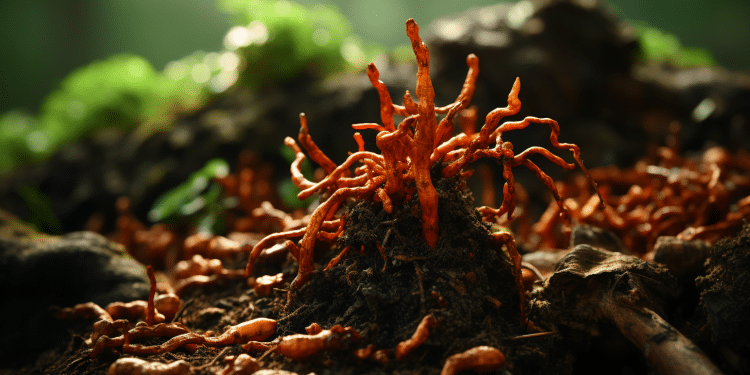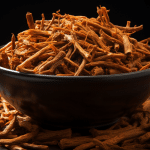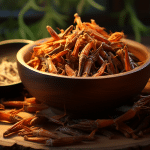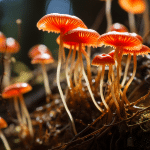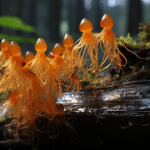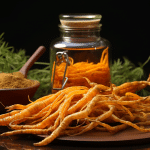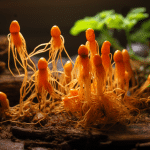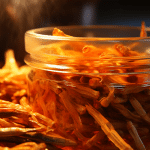Cordyceps mushrooms are known as Himalayan Viagra because of the beneficial effects that they may have on your testosterone production. We looked at recent studies of cordyceps and testosterone, and were pretty impressed by the results.
Does Cordyceps Mushroom Raise Testosterone?
Both cordyceps sinensis and cordyceps militaris appear to boost testosterone levels, according to multiple animal studies. Cordyceps supplementation directly increased the levels of serum luteinizing hormone (LH) and testosterone, and improved the number and motility of sperms in the tested animals.
Cordyceps Sinensis and Testosterone
A functional trial in 2017 examined the effects of cultivated cordyceps sinensis on testosterone production. This study described the stimulatory effects of an aqueous extract of Cordyceps sinensis on erydig cells in mice for steroidogenesis (the biological process by which steroids are produced). It also investigated possible applications of compounds found in Cordyceps sinensis mycelia, such as adenosine and cordycepin, on male reproduction.
In mice, effects of cordycepin and adenosine included increased testosterone production, steroidogenesis, and increased plasma testosterone levels. These bioactive compounds stimulate PKA and PKC/PLC pathways, which are known for regulation of steroidogenesis. The results of this study suggest that cordyceps may be effective for treating individuals who suffer from a lack of testosterone. However, further studies are needed to determine if this mushroom has a similar effect on the reproductive processes of humans.
Cordyceps Militaris and Testosterone
A study published in The American Journal of Chinese Medicine investigated the effects of the military strain cordyceps supplementation on the production of semen and motility of Sprague-Dawley rats. The animals were given the supplement made with the mycelium from Cordyceps militaris for six weeks. Compared with rats not given a supplement, the ones taking the cordyceps militaris had a substantially higher number of epididymal semen. These results suggest that Cordyceps militaris supplementation enhances the sperm quantity and quality in rats, which calls for more studies to determine if these effects also apply to humans.
Is Cordyceps Known as a Natural Viagra?
Cordyceps is commonly called the Natural or Himalayan Viagra due to its beneficial effects on sexual functioning and enhancing sexual endurance.
An animal study investigated the stimulatory effects of cordyceps in vivo and in vitro, in mices lydig cells, which are a major source of testosterone for men. Compounds extracted from cordyceps sinensis mycelium appeared to stimulate the release of testosterone in mice. These findings are promising and call for more studies of Cordyceps effects on male reproductive functions in humans.
Does Cordyceps Increase DHT?
A study from 2020 seems to support cordyceps may boost DHT, at least in animals. This study examined the effects of compounds extracted from the fruit bodies of cordyceps militaris on sexual performance and erectile function of male rats with streptozotocin-induced diabetes. This mushroom had an inhibiting effect on testosterone-induced prostate hypertrophy, but did not decrease levels of testosterone or DHT. Instead, cordyceps increased secretion of DHT and testosterone from primary testicular cells and caused proliferation (increased number of cells) in testicular tissues.
What We Can Conclude About Cordyceps and Testosterone
Here’s what we know so far about cordyceps and testosterone:
Cordyceps mushrooms are commonly called a natural Viagra because of the beneficial effects they have on testosterone levels and sexual functioning.
Cordyceps sinensis modulates steroidogenesis and enhances testosterone production, at least in animals.
Cordyceps militaris appears to enhance sperm motility and production in Sprague-Dawley rats.
Compounds found in the fruiting bodies of cordyceps militaris seem to enhance DHT levels.
More studies on humans are needed to investigate the basic mechanisms underlying the effects of Cordyceps mushrooms on testosterone. Given there is no negative side effect of taking cordyceps mushrooms, it might make sense to incorporate them as an additional, alternative medicine for the prevention of low testosterone levels.
You can find our favorite capsules, powders, and tincture’s on the following pages of our website and learn more about each individually:
List of The Best Cordyceps Supplement
List of The Best Cordyceps Powder
List of The Best Cordyceps Tincture
List of The Best Cordyceps Mushroom Gummies
Let’s Learn More About Testosterone?
Testosterone is a steroid hormone of the androgen type associated with male sperm production and sexual function. Testes are the primary organs of production of testosterone in men. Women’s ovaries also produce testosterone, although only a tiny amount. The production of testosterone is affected by several hypothalamic hormones, such as gonadotropin-releasing hormone and the luteinizing hormone. The latter binds to receptors on the leudig cells (testicular cells that secrete testosterone) and triggers testosterone production.
Symptoms of Low Testosterone Production
- a decrease in sex drive
- weight gain
- less body hair
- thinning bones
- reduced muscle mass
- less energy moodiness
Typical Causes of Low Testosterone Levels
Men’s production of testosterone may begin to slow down naturally at about age 30. Here are a few potential causes of low testosterone:
- alcohol and drug abuse
- genetic conditions
- cancer treatments
- testicular infections and injuries
- certain medications
More On Cordyceps Mushrooms
Cordyceps mushrooms are a staple in Chinese medicine, and they are still commonly considered to be some of the healthiest mushrooms that you can eat. Scientific studies of the health benefits of these adaptogenic mushrooms are in their infancy. However, they are showing incredible potential for preventing and treating a variety of diseases, as well as maintaining optimal mental and physical health.
Cordyceps appears to be beneficial for practically all the organs of the human body. It acts as a natural performance booster for exercising, and studies show it may even prevent some forms of cancer, lower cholesterol levels, prevent oxidative damage, and offer immune-response benefits. Cordyceps appears also to provide a protective effect on chronic inflammation, as well as to reduce acute inflammatory processes associated with kidney transplantation.
Additional Resources:
